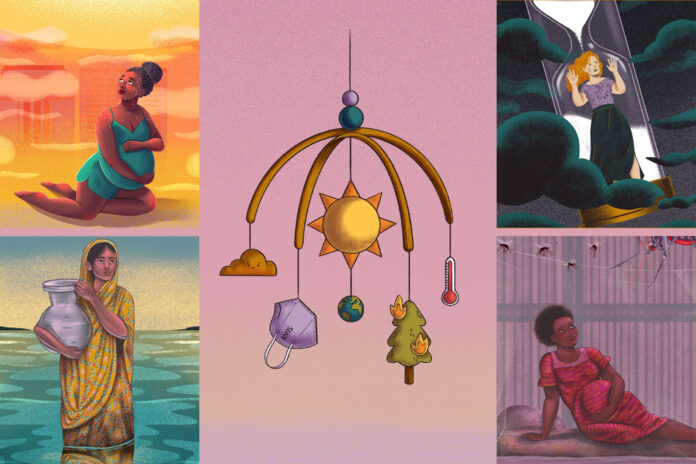The wait is bad: Born on a planet in crisis is a collaboration between Vox, grist, And 19th which examines how climate change affects reproductive health – From menstruation to conception to birth.
Last year more than 134 million babies were born around the world. During that same 12-month period when so many lives began, about 6.8 billion people—about 80% of the world’s population— experienced At least 31 days of extreme heat that were made at least twice as likely by human-caused climate change.
Children being born now will know a world that is not only getting warmer, but also a climate that will only become more unpredictable and increasingly vulnerable to extreme weather and disasters.
Yet while we often talk about climate change with the future of these children in mind, rarely do we consider the impact of the crisis on the current generation who will inherit that world.
At a time when reproductive autonomy is under political attack in the United States, climate change is making it more dangerous to have a womb. The full range of climate-related threats to reproductive health is wide-ranging, but together these stories, created in collaboration with Grist and The 19, will help understand some of the profound effects of warming on people who may become pregnant.
The International Panel on Climate Change has already made that clear Women are more vulnerable to climate change Compared to men, extreme heat, weather and severe climate disasters exacerbate existing gender-based vulnerabilities, such as domestic violence, inadequate access to health care and Financial insecurity.
But there’s another level of climate impact that cuts across gender lines: Research shows that climate change takes a particularly profound physical toll on the body that can bear children — from menstruation to conception. And it is only now, after neglecting to study the climate-related health conditions that affect people who may become pregnant, that the scientific and medical communities are beginning to understand the scope of these threats.
During these crucial nine months, a pregnant woman’s immune system declines so as not to reject the growing fetus, making the parents more susceptible to infectious diseases such as malaria, which have growing climatic elements. Exposure to extreme heat during pregnancy increases the risk of preterm birth. Rising sea levels can add salt to drinking water, which can cause high blood pressure—a risk factor during pregnancy for premature birth and miscarriage. And for those who have access to fertility treatments, which involve highly time-sensitive procedures, the increasingly large and intense storms are making assisted conception even more unpredictable.
Here, you’ll find a package of four stories – four narratives that follow the lives of women who face unexpected risks as they try to conceive and give birth in a warming world. Their stories, below, bring important attention to an issue that has been ignored for too long.
Heat waves increase the number of risky, premature births
Extreme heat is dangerous when you’re pregnant — especially for those in underserved communities. | Won in Virginia

They tried for years for a baby. Then the hurricane hit.
Climate change threatens access to IVF and other forms of fertility treatment. | By Zoya Tierstein and Jessica Kutz

Why pregnancy triples your chances of getting severe malaria
How to protect mothers and babies as warming increases the risk of contracting the disease. | By Zoya Tierstein

Strange link between sea level rise and pregnancy complications
Exposure to salt water can rob women of their reproductive organs and impregnate them. | Zoya Terstein and Mahadi Al Hasnat

Credit
Vox.com Editorial Lead: Paige Vega | Project Manager: Jaime Burger Editor: LV Anderson, Paige Vega, Cara Platoni Reporter: Zoya Tierstein, Virginia Gawin, Jessica Kutz, Mahadi Al Hasnat | Standard/Fact-Checker: Claire Thompson, Joseph Winters, Kate Yoder, Sarah Schweppe, Melissa Hirsch, Katy Penzeimug | Partnership Manager: Rachel Glickhouse, Abby Johnston, Megan Carney Audience: Mirka Moreno, Justin Ray, Shira Turlow Data Visualization: Clayton Aldern, Jasmine Mithani Discrimination against: Teresa Chin | Example: Amelia Bates | Design: Mia Torres, Jason Castro, Cute Khargi Special thanks to: Brian Walsh, Elbert Ventura, Swati Sharma, Bill Carey


